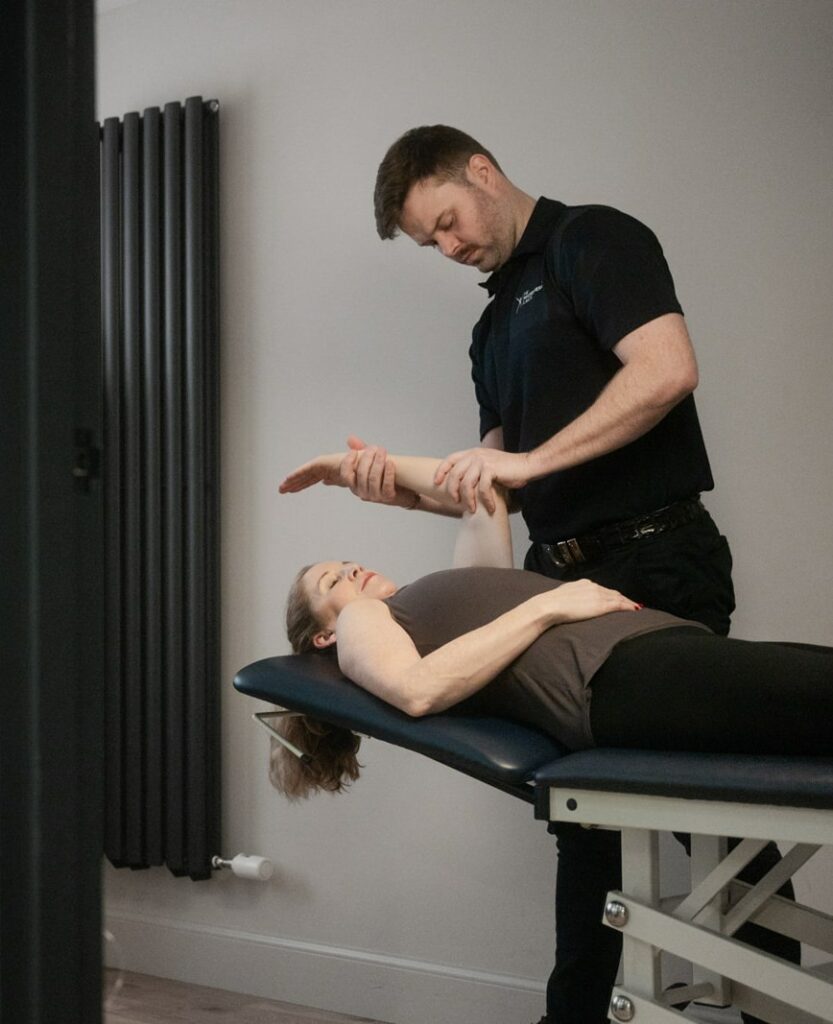
The shoulder joint is the most mobile joint in the human body, giving us incredible range of movement and flexibility. However, along with this extensive movement comes reduced stability therefore making it more prone to injury.
Shoulder wear and tear is less likely as the shoulder is not a weight bearing joint like the hip and knee but injuries to the soft tissue and muscles that surround the shoulder are fairly common. Developing a frozen shoulder is also very common and is covered in another article.
At The Physiotherapy clinics, we understand the importance of establishing a detailed diagnosis to ensure the treatment and advice we provide is accurate and more likely to result in a positive pain free outcome. But it is important, especially after a shoulder injury, to continue with rehabilitation to strengthen and stabilise the shoulder to help protect it from further injury.
Like many joints, it is important to find out what has happened sooner than later to prevent making the injury worse, so let one of our experience Physiotherapists assess your shoulder as soon as you can.
In the meantime, here are a few things you can try:
- Avoid overhead activities, especially if you develop pain or weakness doing this
- Move daily items stored higher up, like utensils, to a lower position
- Modify activities that are causing pain
- Ice your shoulder for 20 minutes 2-3 times a day
- Try the pendular exercise below which can help keep the shoulder mobile without stressing the joint
- If you are ok to take anti-inflammatories, then this may help, especially as inflammation is common with shoulder injuries

Find a location near you
The Physiotherapy Clinics - Gracemount
The Physiotherapy Clinics - Leith
The Physiotherapy Clinics - South Gyle
Peebles Physiotherapy
The Physiotherapy Clinics - Fairmilehead
EXCELLENTTrustindex verifies that the original source of the review is Google. I can't thank Peter enough for guiding me through my shoulder rehabilitation program over the past few months. His instructions were very clear and the instructional videos made available through the app were really useful. I'd had niggling, low-level pain in my shoulder for around 13 years and then recently I lost full range of motion due to a karate injury; after working with Peter I can honestly say that my shoulder now feels better and stronger than it has done for a very long time! Thanks again :-)Trustindex verifies that the original source of the review is Google. Very grateful. Great serviceTrustindex verifies that the original source of the review is Google. I received fantastic, friendly help from Biju for a minor leg injury. The treatment and exercises he gave me completely sorted my issue. Would 100% recommend both him and the clinic!Trustindex verifies that the original source of the review is Google. Had a great experience at this clinic. Antony put together a detailed treatment plan for treating knee pain. He clearly explained how each exercise would benefit the activities I wanted to be able to do. Not only is he a great physio, but he is so friendly and always makes you feel listened to.Trustindex verifies that the original source of the review is Google. Phil has been supporting me a long standing complicated issue, which previous places have been unable to help. Phil's extensive experience and positive approach, coupled with his willingness to think outside the box is making a difference. Recently this approach has included the 3D movement scan. It's very easy to participate in, and it revealed problematic postural and movement detail that would be harder to discover by other means. I recommend the 3D scan as a rehabilitation tool.Trustindex verifies that the original source of the review is Google. I highly recommend the physiotherapy clinic South Gyle. I received a detailed assessment of my problem from Phil. He clearly explained the issues I'm having and why, plus the treatment, exercises required to rectify. Really happy with my experience and I would not hesitate to go back. Thanks PhilTrustindex verifies that the original source of the review is Google. I first attended the South Gyle clinic to see Anthony Guiducci on February 2023. I was suffering from a very painful trapped nerve in the lower back. Later in the year, with the back issue having been virtually cleared, I developed some nerve pain in the right knee along with general stiffness in the left knee. Finally around late October I had "tennis elbow" on my right elbow.I should say that I am 73 years old and spent many years playing contact sports, mainly rugby and football and now in my twilight years golf. It catches up with you eventually 😁. All through this time Anthony has been totally professional with a great knowledge of muscle and nerve structure and their interaction. His approach to giving you remedial exercises is well structured to your ability and takes great care that you keep within your capabilities as you build up the strengthening and more testing lessons. I can highly recommend him to anyone looking for physio help with their injuries or aches and pains. I must also say that, on the odd occasion when I had to use other physios at South Gyle, due to holiday leave I was equally impressed by the expertise of the staff.Trustindex verifies that the original source of the review is Google. Came here with a mild hamstring strain, ran a 3:30 marathon 5 weeks later! Anthony Guiducci = legendTrustindex verifies that the original source of the review is Google. Really thorough consultation. Excellent advice and follow-up arranged.